|
FAQs about Deep Sand Beds
8
Related Articles: Deep Sand Beds, Marine System Substrates (Gravels, Sands) by
Bob Fenner, Marine Substrate
Options by Sara Mavinkurve, Live
Sand, Biological
Filtration, Biominerals in
Seawater, Understanding Calcium &
Alkalinity, Nitrates in
Marine Aquariums,
Related FAQs: DSBs
1, DSBs 2, DSBs 3, DSBs 4,
DSBs 5, DSBs
6,
DSBs
7, DSBs 9, DSBs 10,
& FAQs on: Rationale/Use, Dangers, Physical Make-Up, Biological Make-Up, Size, Location,
Depth, Conversion to/from, Maintenance/ Replacing/Adding To, & Live Sand
FAQs, FAQs 2, Live Sand
3, Identification, Selection/DIY, Systems/Placement, Biota, Maintenance, & Marine Substrates, Live Sand, Mud Filtration
1, Plenums,
Nitrates in Marine
Aquariums,
Refugium
Substrates/DSBs,
|
|
|
Too Much Uncured Live Rock: Phosphates Locked Up
11/25/16
<Please respond to this email instead. Also, I meant to say that my
Phosphate levels are 3-5. not .5, which I fixed below. Mahalo Nui Loa!>
<Real good>
Aloha Friends, Looks like over the years I've put too much live rock, some
of which was uncured from the ocean, in my 100gal tank with 20gal sump and
seem to have phosphates locked up.
<Most all (natural marine carbonate-based rock) will... for a time>
Inhabitants: 2 clowns, 1 strawberry Basslet, 1 Anthias, 1 flame angel, 1
Christmas wrasse, 1 long nose Hawkfish, two seahorses, two coral banded
shrimp and a few crabs. I just introduced some Zoas and a Shroom and am
determined to lower the phosphates so they can grow- along with coralline.
So far no coralline algae in 5 years+!
<Insufficient biomineral (alkaline earths mainly) and/or alkalinity, and/or
more competition from other life forms/conditions favorable to them than
corallines>
All water parameters are good, except very high phosphates of 3-5 and double
the level of ALK- which remains a mystery.
<Check you test kit/gear and supplementation practices>
I’m sure the two must be related but I haven’t been able to find anything in
all my searching. I just bought GFO in hopes of that helping.
<Mmm; lo dudo.... better to study, replace some substrate (rock,
sand/gravel.... increase/install a deeper, finer DSB in the sump likely>
I also just took out about 5 pieces of new live rock coral rubble I recently
placed in there. I am curing in a bucket with current and overnight
phosphates are indeed leaching out as indicated by the test.
<Interesting>
I just started using GFO in my sump bag, since the reactor didn’t make it in
my last order. Will this work, or should I get some other phosphate
absorption pads or something?
<See how what you're doing works for a few weeks is what I'd do... other
fave filtrants are gone over and over on WWM. Boyd's Chemipure,
Polyfilter....>
I know it’s probably better to get to the source. I started trying vinegar
doing but stopped because I don’t want to throw things off balance. Am I at
the point where I need to completely remove the rock and put new cured rock
in?
<This is what I'd do; yes>
Any product you would recommend to use before I go THAT extreme?
<... You've gots to stop your mind darting off in directions....>
Today I’m vacuuming up the cinders I have in the first stage of my sump to
try and reduce more phosphates. I’ve also re-added a filter bag with GFO and
Carbon. I am running an Aqua-medic skimmer in the first chamber of the sump
and in the second growing what looks like Caulerpa racemosa, long and skinny
with tiny spherical bubbles. It gets messy and kind of floats but has been
growing for years and still high phosphates.
<Are you in Hawaii? Look for better limu... Gracilaria species... Ogo>
It looks like in this pic I need another chamber to my sump, right?
<Up to you>
Or is this “natural” system fine like this if I’m careful so the pods go
back to the display tank. The sump is plumbed outside to get direct sunlight
for the Caulerpa growth.
I recently added an RO unit which may help with the ALK levels since I had
13PPM in that rain catchment water (3X filtered) to begin with. I really
appreciate your help with this challenging situation. I don’t want to give
up on this!!! Mahaloz!
<There are ways to decrease the natural alkalinity... gone over on WWM. For
now, just mixing in more RO...
A hu'i hou! Bob Fenner>
In Radiant Health,
Sky Kubby
|
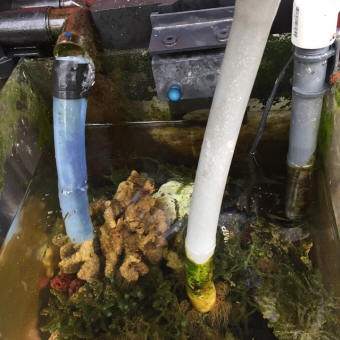
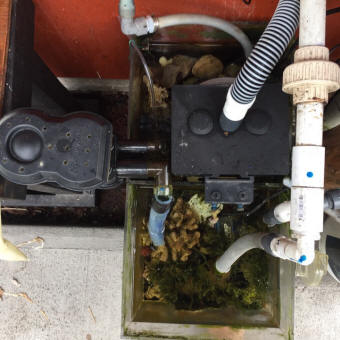 |
Re: Too Much Uncured Live Rock: Phosphates Locked Up
11/25/16
Your passion and dedication to this work is inspiring- burning the midnight
oil answering my question.
<Am indeed enthusiastic re life, petfish, helping... and am out in
Madagascar>
I feel blessed and you rock! Mahalo for confirming what my gut was telling
me. So it seems curing a bunch more live rock and switching it out in a
couple months is the path I’m on. A couple points: I already have a DSB of
3" in both my DT and my sump’s 2nd chamber. The first is cinders. There are
different colors and bubbles in the DT and sump sand. Do you still recommend
to change out all the sand and rock?
<Yes I would; and have no cinders... all sand as gone over on WWM. Do you
need help searching, using the indices for?>
Just to be ultra clear, we’re talking about as porous of coral live rubble
as I can find and harvesting dry sand of different textures. Larger grains
first, then finer atop that? Or better to actually order some of the more
porous, like Aragonite and seed it with some of my tank water and sand?
<Finer is better:
http://www.wetwebmedia.com/deepsandbeds.htm
and the linked files above>
I have some cool rock now with awesome caves, but I guess all that may be
trash now if too high phosphates locked up in them. So I can’t cure that,
but I could acid bath it… I will indeed wait and see what happens for a
little while I implement 1/4 to 1/3 RODI water changes 1-2X weekly. Sound
good?
<Sure>
Also, as far as no coralline growth, you mentioned "Insufficient biomineral
(alkaline earths mainly) and/or alkalinity, and/or more competition from
other life forms/conditions favorable to them than corallines”. But ALK
levels are off the charts, not insufficient.
<Need both; responses written for ALL, not just you, 30k folks a day use
WWM... PLEASE: search and read on WWM ahead of writing>
I poured over everything over the years and asked many people- I can’t find
out why the ALK levels would be so high.
<... gone over on the site: http://www.wetwebmedia.com/alktrbfix.htm
PH is 8.0 so I’ll try raising it to see if that helps. I’m only dosing a
little Mg., but no CA as levels were good or high, even.
<.... precipitated out by....>
I don’t really have any corals growing so nothing seems to be needing those
nutrients I was dosing before in hopes of coralline growth. I’m thinking no
coralline was just from extremely Phosphates levels (5). I’m using a brand
new Salifert test kit.
<Ahh; this should be accurate, precise>
Two arrived so I’ll try the other one. Tap water tests 0, though. But it
does say on the kit that extremely high ALK levels with throw the results.
That’s me! Nothing I have read says how to decrease ALK levels except
massive water changes. It always talks about the balance between ALK/Calcium
but not ALK/Phosphates. I’ll keep researching, though!
<Good>
I’m headed Kona side this weekend with my wife and daughter so I’ll hunt for
better Limu and maybe some rock. Ogo seemed messy last time I tried to grow
it- but I’ll try it again. I have the benefit of having my sump outside in
the natural sunlight so I hope that can pay off!
<See Gerald Heslinga or others re the Ogo at NELHA, next to Keauhou>
Let me know next time you’re on the Island- we can free dive and I can give
back to you some of my brand of super food chocolate (Medicinal-Foods.com).
A hu'i hou!
<Oh! Will do. Mahalo. BobF>
In Gratitude,
Sky Kubby
Here's some pics for ya from my last message.
11/25/16
<Wow; even a seahorse! BobF>
Sky Kubby
|
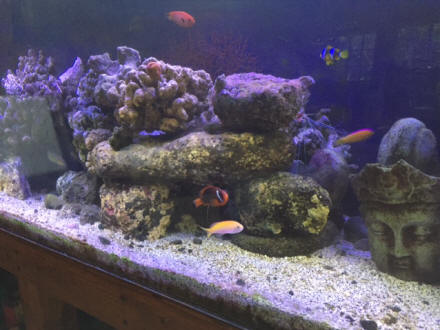
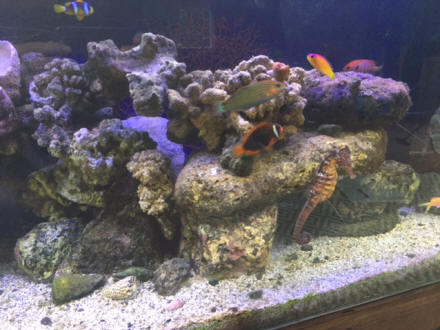
|
Re: Too Much Uncured Live Rock: Phosphates Locked Up
11/26/16
Aloha Bob! I read more (another day's worth) and realize I am in between with my
DSB. Seems better to siphon clean the 2-3" of sand, in sections, to help pull
out some phosphates. Then, depending upon if my PO4 levels go down then remove
sand or add another few inches after. I could also leave a shallow sand level
and keep the DSB in the dump.
<I'd vacuum; add more fine material....>
I'm going to go with your suggestion of lights on during curing, however my
curing tank will be outside in natural sunlight. In this case would you still
suggest it?
<Yes>
I know you say algae comes and goes during cycling. But since there will be no
doubt more algae to deal with curing in direct sunlight, I'm concerned about my
nice rock being covered in the stuff and caked on the walls of the 30 gal glass
aquarium I was thinking of using.
Also, if I used copper in the tank before is guess I shouldn't use that tank to
cure, right?
<Not a worry... all Cu is gone; insolubilized>
Better to use a rubber made 50 gal shallow tub and let the algae grow on the
sides?
<Either way>
I tried searching for issues with curing in an old copper treated tank several
times to no avail. The issue with my searching is that only five or so
semi-relevant posts come up in my iPhone. The rest are blocked off. I guess I
have to wait until I get to my computer.
<Yikes! Thank you for this valuable information. I did not know this... Don't
use my phone for such searches (D'oh!)>
Lastly, I only have a two-chamber sump so I'm going with removing those cinders
from the first chamber - maybe why I have too high Alk? Someone suggested
cinders who claimed to be an expert online. But I agree let's get rid of em! I
was thinking more surface area but understand there may be bad metals in there.
Perhaps some phosphates will come out as well!
<Don't think (volcanic?) cinders contribute much/anything to alkalinity...
they're not carbonate based, but silicate mostly>
Another possibility for the 5 reading by my phosphate test was the few pieces of
LR I added to the without curing (which are now). Strange, though, that reading
came with 0 Nitrates, Nitrites and Ammonia- lending me to believe it was
phosphate lock-up.
So my plan is to add LR and rubble pieces to the first chamber of the sump after
removing the cinders. I'll remove my bag and let the flow from the DT fall
directly onto this to keep movement going. Keep in mind the tank is off-grid
solar powered so I can save adding another power head this way.
<Ok>
I can easily remove the rock and pump the detritus through a filter bad into the
second chamber for periodic cleanings or siphon out into the ground when I do
water changes.
I'll keep the second chamber DSB- with a twist. Since it's the only other place
to return to the DT, I'll put coral rubble atop the sand and cover the return
pump with rubble, to avoid the Limu (seaweed) also growing in there from getting
sucked into the pump. Hopefully pods and such still make it through!
I know you don't suggest all that action in one chamber but I'm out of space in
my 20 gal sump. Perhaps it's time for an upgrade, or can My system thrive with
this setup for my 100g. DT?
<MUCH better; yes>
Keep in mind I have the whole side of my house, plenty of sun and my wife cool
with it!
<Good>
I guess I could drill into my acrylic sump and have a 2" pipe flow into a 10g
tank, then pump out of there so I don't get a bunch of sand and stuff in the
return. Would you suggest that?
<I'd use the larger sump/tote >
That should cover all my questions. I know it's a lot but Mahalo Nui Loa!
Looking forward to donating when I get back to my computer!
<Cheers, BobF>
Sky Kubby
Re: Too Much Uncured Live Rock: Phosphates Locked Up
11/26/16
Bob, I almost forgot! I'm going to Keauhou today to hint for limu. Will the Ogo
grow loose or does it need to be attached to a rock?
<See our prev. corr. I'd just buy from IPSF. B>
Sky Kubby
Limu! 11/26/16
Thanks for the inspiration Bob! I think I've tried growing these
before.
Looks like Ogo on the left but I think not quite. I'll look on the WWM
ID section. Do I just stick under some rock in my sump to see if it
latches on?
<The Gracilaria species (there are a few in HI, many worldwide) are
Reds/Rhodophytes, largely unattached...>
I'm pretty sure the one on the right is a type of Nori. Bless!
<Is an Ulva, Ulvales at least. B>
Sky Kubby
|
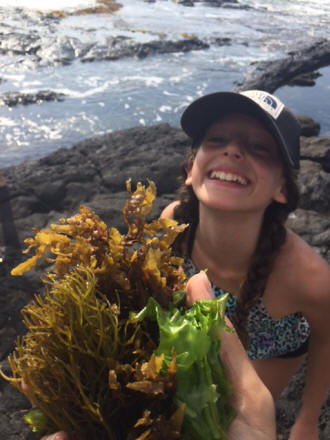 |
|
Hawaii Coral Sand at Home Depot for DSB?
11/26/16
Aloha Crew. Will this sand work for a DSB with the variety of size? I can
harvest similar, but it will have a die off- I think this is just crushed coral
but I'm not sure. Best to cure or just use natural sand? There's some. If 3mm
Big chunks in here. Mahalo!
Ps. The chunks are bigger than they look in the pic...
<I would definitely use this... and NOT collect, clean my own. Bob Fenner>
Sky Kubby
|
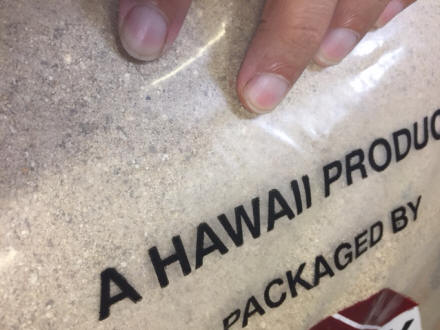 |
|
Please help.. have a question concerning deep sand beds
4/11/16
I have a sumpless 50 gallon breeder about 3 years up
and running. live
stock one pair bonded onyx ocellaris, one royal gr. 3 hermits (phasing
them out of my system )blood shrimp, a mix of snails . Hob refugium
w/Chaeto, ReefOct protein skimmer, now I'm thinking back to 3 years ago
so approx 40 lbs Pukani on shelf made of pvc/egg create n aquarium
sealant thought it would help with water circulation and also detritus
build up and easily removing it. 2inch sugar fine sand bed,
<Mmm; must have a screen twixt this and the eggcrate>
also have 60 lbs of sugar fine dry sand unused on hand my
perimeters in check besides nitrate about
80ppm,
<Much too high>
seems to be sand bed my method of reason is the 2+2=4 methodology. i
want to go back to reef keeping softies again but want to go dsb,
<Yes; I would>
now my 2+2=4 methodology is failing me,becuase I do see life in the sand
bed also small bubbles in the front of the class not sure if I should
vacuum in small portions the 2-inch sand bed that I have and remove the
Shelf
make sure my nitrates come down,
<Yes; I'd remove the shelf; after removing the present sand...
add the new (washed) that you've saved out thus far along w/ replacing
the old in the tank... Putting all in here>
I'm not even sure if they can hit 0 or if they even need to come down
all the way just trying to get the Trapped
detritus out of the bed or at least most of it . Than slowly start to
add a half an inch of dry sand mixed in to the top layer and maybe add
week by week until I reach my 4-inch Sand Depth, or if I should just try
to remove the hole sand bed and start again I'm not I don't know I'm
kind of at a loss now.
<As stated above. mix, add altogether and put in sans the
eggcrate and screen>
Now what I was told by someone else is to go ahead and just add 2 inches
on top of the existing sand bed which my 2+2=4 tells me that that
wouldn't be a good idea because reality is that I would be Trapping all
the detritus and that last two inches along with all the life. This
scenario I have partially arisen because of poor, husbandry do to
illness.
Am trying to fix problem.
Thank you so much in advance....jay
<IF you have time, interest, search and READ on WWM re DSBs,
Plenums, Nitrate Control. All search-able.
Bob Fenner>
re: Please help.. have a question concerning deep sand beds
4/11/16
Yes thank you very much again yes I was already reading for the past few
days , but I couldn't find the scenario remotely similar to mine or
maybe I didn't go down far enough I know that a lot of readings where
from 06. I
have no screen the only thing that I have is egg crate on top of PVC
stilts
I guess you would say thin pipes ,
<Okay>
and the 60 pounds of sand that's dry is just what I didn't use after my
initial setup for years ago basically from
what I understand from my email back is to go ahead and scrap da
3 year old sand bed what I have inside of the tank,
<Or rinse it very well before re-using>
that means that I would have to get and least 2- 30 lbs possibly 3 bags
of dry aragonite sugar fine sand, after I have siphoned all of the sand
out then I can just put that sand directly in there I'm assuming that
I'm keeping at least maybe a half an inch of my existence and or
not to be able to put that on top the dry dead sand,
<.... READ HERE:
http://www.wetwebmedia.com/dsbdangers.htm >
I really thought that I could save my existing sand, maybe I can get a
screen,
<You can....>
I have some that I purchased years ago but I don't remember what I
purchased I know it's black .. maybe it was black fiberglass
<This or plastic screen door material will do/work>
I don't know how they come I'll find out maybe it would be good to add
ask got to go too deep into the layers as far as fish speaking of that
what I have to take the fish out and put them in a 5 gallon bucket, and
at what time could
they be added back to the dt, because I really don't know how or if the
tank cycles and how that's going to affect livestock cuz I have never
went this route of adding stuff back to the tank especially at that
quantity..
thank
you again
<Welcome. BobF>
re: Please help.. have a question concerning deep sand beds... the fifth
time 4/11/16
And this is assuming that I understood exactly what you said, my
apologies I'm not technically a writer and I try to proofread as best as
I could so I hope that I didn't say something that may be confusing
situation
<Is, was... I'd just re-wash and add to your current sand...
removing the support. Clear? B>
re: Please help.. have a question concerning deep sand beds
4/11/16
Basically take the two inches that I currently have out of DT because I
can reuse it to top off the 60 dry dead sand..so just basically I am
reusing it but just rinsing the sand getting the detritus out
,presumably with saltwater so I can still retain some of the life that's
in the sand, then install the new 60 pounds of dry dead sugar fine
aragonite, then with the other 2 inches that I already rinsed top off
which should get me around 4 inches or so if not 4 inches then I'll
probably have to buy some more mix it in at the top and then from there
it should be smooth sailing ,also ditch the rock lifts and just put the
live rock directly on the same bed..than I should be able to add at my
livestock.lol I think I've got it if this is what you're saying. I hope
I don't come off as sounding slow...trust me am not slow..lol this is
just a newer thing I have never encounter during a setup normally I
would never have done this in the middle of a setup that's already been
established and if I were I would start from scratch...sorry...bout this
I truly value the information.. so if this is basically the steps....
then I just need to make a plan to be able to execute at all and one
shot.. thank you for the very fast reply especially on a Sunday....
and I will continue to browse the web site
<Good. B>
|
Remote Deep Sand Bed question (maint.); and Scler. hlth.
follow up f' 1/7/14
Hello Mr. F and a worm Happy New Year from a cold Romania,
<Hey Andrei>
Well, the things have evolved interestingly around here. As you may
remember I was having problems with my SPS corals loosing colors and
getting covered in cyanobacteria along with the live rock in the DT and
some of the sand, approximately 6 weeks after I started the RDSB in my
basement with 100 Kg of new dry sand. I have been doing what you have
advised me and the results started to show. First of all, my corals
started getting their colors back, the Cyano receded a lot and I see
polyps showing on some SPS that I thought they were long gone. ( they
were covered in Cyano during the worst days and
I would brush them every day but show no polyps for several weeks ).
Basically I added amino acids and Vibrance ( Iodide ) every day
mixed with CoralSnow from KorallenZucht that is " a liquid secondary
biological facilitator for elements like B-Balance or
Potassium-Iodide/Fluoride Concentrate. Compatible with all elements,
also for Amino Acid and Vitalizer " that seemed to work for my case, 5 %
water changes daily and cleaning the
corals and rock. And I left the lights off for one day, and after that
the things really improved. I still have some Cyano on rocks but the
corals, even if they are not perfectly recovered, don`t get it directly
on they`r tissue anymore.
That was the introduction that says that your advices worked.
Now about my question: I have attached a photo of my RDSB installed in
my basement after 10 weeks of functioning. In the lower level there is a
live rock than from where the water returns in my upstairs sump and then
the DT.
As you see there is live rock over the sand bed also. My concern is
about the correct maintenance of this RDSB. I have read lots of
information on wwm on DSB but most of them are about Display DSB and not
RDSB, so I want to be sure how to adapt them to my conditions. The
only flow in the DSB tank comes from the return pipe from the mid-sump.
Is this enough or not, to keep detritus not depositing on the bed?
<Should be; if not, do stir, siphon out if too much accumulates>
Should I use some filter sock on the return pipe?
<A good idea if there's an apparent need/use>
Should I siphon the detritus accumulated on the surface of the sand?
<Ah yes>
Should I add some snails that would stir the sand?
<You could... perhaps Nassarius genus>
In the morning I see especially on the Chaetomorpha lots of tiny stars and
snails and now some channels started to be seen through the glass that
would indicate the presence of worms. But how would I know if they are
enough?
<By their actions, results... in time>
All the sand was dry, my aquarium water just passed above it and I added
the live rock that you see.
I am trying to avoid the hardening of the upper level of this sand bed,
and also the formation of hydrogen sulfide, so basically I want to
maintain it in good conditions so it will fulfill it`s primary purpose :
nutriments removal.
<Understood... Patience, as always>
thank you,
Andrei
<Welcome. BobF>
PS: my Zanclus Cornutus which is now 9 months in the DT is doing great
along with all the other fishes.
<Ah good>
|
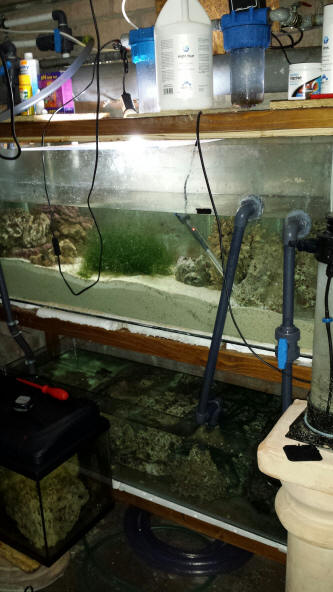 |
|
|

